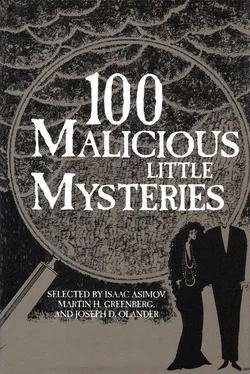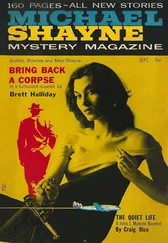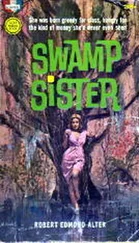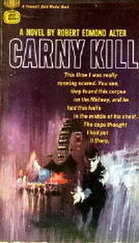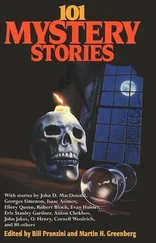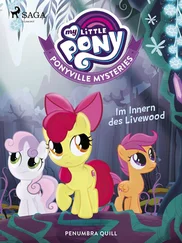I looked out the window several times in the next few days, but I must’ve picked the wrong times because I didn’t see Ben. Other guys kept telling me about Big Ben and his bird and how well it could fly and how it came to him when he whistled for it. Baby became the chief topic of conversation around the Education Building. A couple of men joked that they wished Big Ben would teach them to fly — they wanted to see what’s on the other side of the prison’s thirty-five foot wall.
Then one day I saw Big Ben sitting alone on the steps of A-cellhouse. I sensed that something was wrong and went over to him. “How’s Baby?” I asked.
“He’s gone,” Ben said. “Flew away. Sat up there,” he motioned vaguely toward the wall, “and looked back once, then flew away.”
“Maybe he’ll come back.”
“Naw, he won’t come back.” His voice held notes of both pain and anger. “Boids is like people. When they don’t need ya no more, they forgets ya.”
I remembered that someone had once told me Big Ben hadn’t received a letter in two years. “Maybe Baby just decided to look around,” I said as cheerfully as I could. “Birds do that all the time. It wouldn’t surprise me if he came back. The swallows always return to Capistrano.”
Ben gave me a cold look, then ignored me, so I went inside; but I was a little worried and kept going to the window to keep an eye on him. That’s how I happened to be around when the bird returned a few hours later and perched on his shoulder. He cupped it in his huge hands and sat talking to it for a long time. Tears ran down his cheeks, and his back shook. I watched as he touched the bird gently with his lips, then squeezed the life from it.
What Kind of Person Are You?
by Bill Pronzini and Barry N. Malzberg
I arrived at Quality Supermarkets’ Fairfield branch promptly at nine o’clock Monday morning and went immediately into the office to check the weekend receipts. A roving district manager with twelve stores and nearly one hundred employees to monitor cannot afford to waste time; I work on a very tight schedule.
At 9:40 I stood and walked quickly into the store proper, to where Franklin was working at Register Three, his regular post. I waited until he finished serving a customer and then motioned him to close down and join me. When he had done that, I took him back into the office and told him to sit down.
He sat poised on the edge of the chair, hands picking nervously at each other; he was about twenty-four, red-haired and gangly, and he reminded me somewhat of my son Ronald. I did not say anything for a time, watching him. He fidgeted under my scrutiny, eyes touching mine, flicking away, flicking back. But he always seemed to be nervous in my presence; I had a reputation as a somewhat stern and uncompromising supervisor.
“I’ll get directly to the point,” I said. “I have just been over the weekend receipts and register slips, and you’re seventy dollars short, Franklin — fifty on Saturday and twenty on Sunday.”
His eyes grew wide and his face paled visibly. “Seventy dollars?” he said.
“Exactly seventy dollars. That is a considerable amount, Franklin, as I’m sure you realize.”
“Are you certain, Mr. Adams? I mean, couldn’t you have made a mistake...”
“I do not make mistakes,” I said stiffly. “The mistake here, if that is what it is, rests squarely on your shoulders.”
“I... I don’t know what to say. I’ve never been short before, I’m always careful—”
“Indeed?”
“I haven’t been off a penny in the two months I’ve been working here,” Franklin said. “You know that, sir.”
“I do know it, yes,” I said, “but the fact remains that you are seventy dollars short for this past weekend — exactly seventy dollars, not a cent more or less. The question now is what kind of person are you, Franklin?”
“Sir?”
“What kind of person are you?” I repeated. “An honest and fallible one, whose only crime is making careless errors in mathematics? Or a foolish and culpable one who succumbed to the obvious temptation?”
His mouth opened, as though in shock, and he blinked rapidly several times. “Mr. Adams, you don’t think I stole that money?”
“Did you?”
“No. No!”
I held up a hand. “I am not accusing you of anything, Franklin. I am merely trying to ascertain the truth of the situation here.”
“I’m not a thief,” he said desperately. “You’ve got to believe that, Mr. Adams. I don’t know how I could have made a seventy-dollar mistake, but that’s all it was — a mistake. I swear it.”
“I would like to believe that.”
“You’ve got to believe it,” he said, “it’s the truth.”
I picked up my pencil and tapped the eraser on the sheaf of papers spread out in front of me. “Embezzlement of funds is a serious offense, you know. I could have you arrested, or at the very least summarily fired.”
“Please, Mr. Adams — I didn’t steal that money!”
“Have you ever been in trouble before? Any kind of trouble?”
“No, sir, never. Never.”
I sighed. “Very well, then. I am not a harsh man, and I have a son about your age; I see no reason not to give you the benefit of the doubt, particularly in view of your prior work record. If you’re willing to replace the seventy dollars, and assuming something like this does not happen again, I suppose I am willing to drop the matter entirely.”
Relief made him slump on the chair. “I’ll replace the money, sure,” he said eagerly, “I know I’m responsible for it. I don’t have seventy dollars with me, but I can have it by tomorrow; I’ll borrow it from my father—”
“That won’t be necessary, Franklin. I will accept ten dollars now and ten dollars per week for the next six weeks, assuming again that there are no further shortages and you continue to do your job properly.”
“I will, Mr. Adams, I’ll be extra-careful. It’ll never happen again, I promise you that.”
“For your sake,” I said, “see that you keep that promise.”
He nodded and produced his wallet and handed me a ten-dollar bill. I took it and laid it carefully on the desk. “You can go back to work now,” I said.
“Yes, sir. Thank you, Mr. Adams.”
When he was gone I sat for a moment looking at the register receipts, the branch ledger-books. Then I finished my work, closed everything into the safe, put Franklin’s ten-dollar bill into my own wallet, and left the store to continue my rounds...
I arrived at the Essex branch at precisely noon and spent nearly an hour checking the weekend receipts. At 12:50 I went out into the store proper and brought Trowbridge — another young man in his early twenties, tall and thin like Ronald — back to the office and told him to sit down.
“I have just been going over the weekend receipts,” I said, “and you’re seventy dollars short — fifty on Saturday and twenty on Sunday.”
He stared at me incredulously.
“The question now is,” I said, “what kind of person are you?”
At eight the following Friday night, I arrived at the Dunes Motel on the outskirts of the city, knocked on the door of Unit Eight, and was admitted.
“Right on time,” Cobb said.
“I am always punctual.” I opened my wallet and laid two hundred and fifty dollars on the bed.
He picked it up and counted it twice. “O.K., Adams,” he said. “That takes care of the first installment. Six more weeks and Ronnie and I will be square.” He chuckled. “Unless he decides to borrow another thousand to pay off some more of his gambling debts.”
“Ronald will never borrow another dime from you,” I said, “I’ll see to that. And he is not gambling any more.”
Читать дальше
